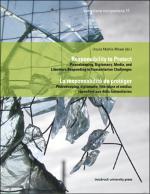Responsibility to Protect
Peacekeeping, Diplomacy, Media, and Literature - Responding to Humanitarian Challenges
| dc.contributor.editor | Mathis-Moser, Ursula | |
| dc.date.accessioned | 2020-07-07T14:14:48Z | |
| dc.date.available | 2020-07-07T14:14:48Z | |
| dc.date.issued | 2012 | |
| dc.identifier | ONIX_20200707_9783902719775_6 | |
| dc.identifier | OCN: 1253411715 | |
| dc.identifier.uri | https://library.oapen.org/handle/20.500.12657/39930 | |
| dc.description.abstract | The principle of R2P – “Responsibility to Protect” – is intended to successfully counteract the international community’s powerlessness and failure to act in the face of crises and humanitarian catastrophes. It commits the international community to intervene in cases of genocide and crimes against humanity – in extreme cases even against the will of the state concerned. Originally established in peacekeeping, R2P, in certain ways a Canadian “invention”, also involves other areas of operation such as diplomacy, literature, and the media. The 19 articles assembled in this volume, which discuss the concept and the history of ist realization, contain both general reflections on a new understanding of state sovereignty and case studies dealing with particularly explosive political situations (Sudan, Afghanistan). Furthermore, beyond the responsibility of the political and diplomatic instances, the texts examine that of the media as sources of information, and the role of literature which – far beyond mere documentary writing – develops its own strategies and scenarios of how conflicts can be solved. - La “responsabilité de protéger” (R2P) est la tentative de combattre l’impuissance et la passivité de la communauté internationale en cas de crises et de catastrophes humanitaires, c’est-à-dire d’intervenir en cas de génocide et de crime contre l’humanité, et dans le pire des cas, d’intervenir même contre la volonté de l’État concerné. Se référant à l’origine au “Peacekeeping”, le projet R2P qui s’est développé avec l’importante participation du Canada, met également à contribution d’autres secteurs comme la diplomatie, les médias et la littérature. Les 19 contributions de ce volume qui éclairent le concept et l’histoire de sa réalisation comprennent aussi bien des prises de position pour une nouvelle conception de la souveraineté que des études de cas sur des situations politiques explosives (Soudan, Afghanistan). De plus, au-delà de la responsabilité manifeste des instances politiques et diplomatiques, les textes rassemblés abordent la responsabilité des médias en tant que sources d’information, et l’apport de la littérature qui, bien au-delà d’une écriture “documentaire”, propose des stratégies et des scénarios pour résoudre des conflits. | |
| dc.language | English | |
| dc.language | French | |
| dc.relation.ispartofseries | canadiana oenipontana | |
| dc.subject.classification | thema EDItEUR::D Biography, Literature and Literary studies | en_US |
| dc.subject.classification | thema EDItEUR::G Reference, Information and Interdisciplinary subjects::GT Interdisciplinary studies::GTU Peace studies and conflict resolution | en_US |
| dc.subject.classification | thema EDItEUR::J Society and Social Sciences::JB Society and culture: general::JBC Cultural and media studies::JBCT Media studies | en_US |
| dc.subject.other | Canadian Studies Centre | |
| dc.subject.other | Peacekeeping | |
| dc.subject.other | Literary studies | |
| dc.subject.other | Media studies | |
| dc.subject.other | Zentrum für Kanadastudien | |
| dc.subject.other | Friedensforschung | |
| dc.subject.other | Literaturwissenschaften | |
| dc.subject.other | Medienwissenschaften | |
| dc.title | Responsibility to Protect | |
| dc.title.alternative | Peacekeeping, Diplomacy, Media, and Literature - Responding to Humanitarian Challenges | |
| dc.type | book | |
| oapen.relation.isPublishedBy | 7e4aa047-ebd5-4269-b6c8-a86925324b93 | |
| oapen.collection | AG Universitätsverlage | |
| oapen.series.number | 11 | |
| oapen.pages | 368 | |
| oapen.place.publication | Innsbruck | |
| oapen.remark.public | 21-7-2020 - No DOI registered in CrossRef for ISBN 9783902719775 |

